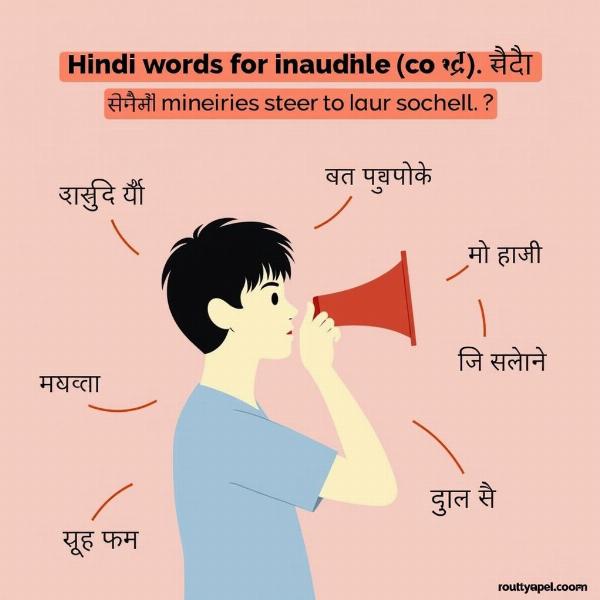Understanding the meaning of “inaudible” and its Hindi equivalents is crucial for clear communication, especially in translation and interpretation. Whether you’re dealing with technical documents, legal proceedings, or everyday conversations, accurately conveying the concept of “inaudible” is essential. This article will delve into the various ways to express “inaudible” in Hindi, exploring nuances and providing practical examples to ensure your communication is precise and effective.
Different Ways to Say Inaudible in Hindi
There isn’t one single perfect translation for “inaudible” in Hindi. The best choice depends on the specific context. Here are some common options:
-
अश्रव्य (Ashravya): This is perhaps the most direct and formal translation of “inaudible.” It literally means “not hearable” and is suitable for formal contexts like academic papers or technical manuals.
-
सुनाई न देने योग्य (Sunai na dene yogya): This phrase translates to “not capable of being heard.” It’s slightly less formal than “ashravya” and works well in everyday conversations.
-
सुनने में न आने वाला (Sunne mein na aane wala): This translates to “that which does not come in hearing.” It’s a more colloquial option, suitable for informal settings.
-
ध्वनिहीन (Dhvaniheen): This word means “soundless” or “without sound.” While not a direct translation of “inaudible,” it can be used in situations where the lack of sound makes something inaudible. For example, a silent film could be described as having dhvaniheen portions.
-
बहुत धीमा (Bahut dheema): Meaning “very low/slow,” this can be used if something is inaudible due to its low volume. For instance, a whisper might be described as “bahut dheema.”
 Visual representation of the concept of "inaudible" in Hindi
Visual representation of the concept of "inaudible" in Hindi
Choosing the Right Word
The context is key when choosing the right Hindi equivalent for “inaudible.” Consider the following:
-
Formality: For formal situations, opt for “ashravya.” For informal conversations, “sunai na dene yogya” or “sunne mein na aane wala” are appropriate.
-
Reason for Inaudibility: If something is inaudible due to low volume, “bahut dheema” might be suitable. If it’s due to a complete lack of sound, “dhvaniheen” might be a better choice.
-
Target Audience: Consider the language proficiency of your audience. Simpler phrases are generally better for broader audiences.
Examples of Usage
Let’s look at some examples to illustrate the usage of these words:
-
Formal: “The recording was ashravya due to technical difficulties.” (रिकॉर्डिंग तकनीकी कठिनाइयों के कारण अश्रव्य थी।)
-
Informal: “I couldn’t hear you; your voice was sunai na dene yogya.” (मैं आपको सुन नहीं पाया; आपकी आवाज़ सुनाई न देने योग्य थी।)
-
Low Volume: “His whisper was bahut dheema; I couldn’t make out what he said.” (उसकी फुसफुसाहट बहुत धीमी थी; मैं समझ नहीं पाया कि उसने क्या कहा।)
What if the Sound is Distorted, Not Completely Inaudible?
Sometimes, a sound might be distorted or unclear, but not entirely inaudible. In such cases, you can use phrases like:
- विकृत (Vikrit): Distorted
- अस्पष्ट (Aspasht): Unclear
- समझ में न आने वाला (Samajh mein na aane wala): Not understandable
Expert Insights
Dr. Anika Sharma, a renowned linguist specializing in Hindi, emphasizes the importance of contextual understanding when translating “inaudible.” “Choosing the right word can significantly impact the clarity of your message,” she says. “Consider the specific situation and your audience to ensure accurate communication.”
Mr. Rohan Verma, a seasoned translator, adds, “While ‘ashravya’ is a good general translation, exploring alternative expressions like ‘sunai na dene yogya’ can make your language more nuanced and natural.”
Conclusion
Accurately translating “inaudible” into Hindi requires understanding the nuances of different expressions. By considering the context, formality, and reason for inaudibility, you can choose the most appropriate word or phrase to ensure clear and effective communication. This article has provided you with a comprehensive overview of the various ways to express “inaudible” in Hindi, equipping you with the tools to navigate diverse communication scenarios.
FAQ
-
What is the most formal way to say “inaudible” in Hindi? Ashravya (अश्रव्य) is the most formal translation.
-
Can I use “dhvaniheen” for “inaudible”? Yes, if the inaudibility is due to the absence of sound.
-
What if the sound is distorted, not completely inaudible? Use words like vikrit (विकृत) or aspasht (अस्पष्ट).
-
What should I consider when choosing the right word? Context, formality, and reason for inaudibility.
-
Where can I find more resources on Hindi translation? Meaning-Hindi.in offers professional translation services for various needs.
About Meaning-Hindi.in
Meaning-Hindi.in is your trusted partner for accurate and reliable Hindi translation services. We specialize in business, legal, technical, website, educational, and specialized translations, offering fast and efficient solutions for all your linguistic needs. Whether you need to translate documents, localize your website, or interpret conversations, our expert team is here to help. Contact us today for a free quote! Email: [email protected], Phone: +91 11-4502-7584. Meaning-Hindi.in provides high-quality Hindi translation services for diverse industries, ensuring clear and culturally sensitive communication.